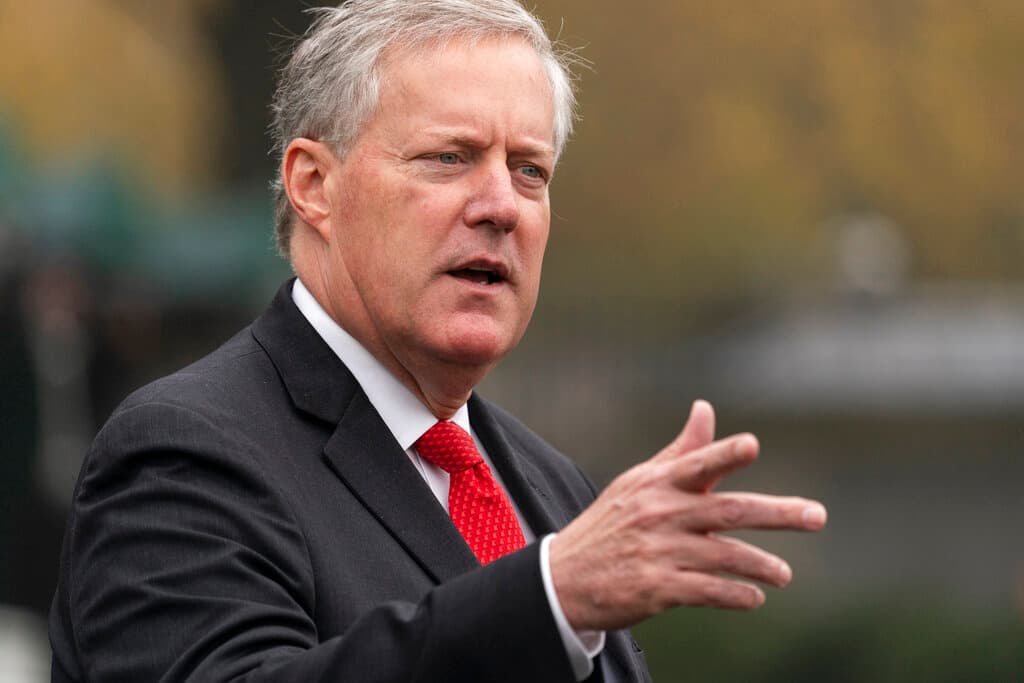Warning Signs Flash for Trump as Mark Meadows Suffers a Judicial Wipeout
An appeals court rejects a bid to move to federal court the racketeering trial of the 45th president’s chief of staff.

An appellate defeat by President Trump’s chief of staff, Mark Meadows, augurs ill tidings for Mr. Trump’s case that the office he held protects him from the prosecution he now faces.
Mr. Meadows, like his one-time boss, faces criminal charges in Georgia for efforts to overturn the results of the 2020 election. He, along with Mr. Trump and 17 others, is accused of engaging in racketeering and working to further a “criminal enterprise.”
Those charges have been brought in state court. Mr. Meadows, though, wants his case to be heard in federal court, which would sweep in a more politically diverse jury than one drawn exclusively from Fulton County. Removal is warranted when a criminal defendant is a federal officer acting in an official capacity.
Mr. Meadows failed to convince the district court judge, Soctt McAfee, that he was entitled to removal on the basis of his post-election work. Now comes a unanimous panel of the United States Court of Appeals for the 11th Circuit to rule that removal is not available to a former official, and that in any event Mr. Meadows’s activities were not official acts.
The panel — Chief Judge Pryor, along with Judges Robin Rosenbaum and Nancy Abudu — explains that removal is meant to “protect an officer of the United States from having to answer for his official conduct in a state court.” It is meant to serve as a guardrail of federalism, and a shield against state encroachment on federal prerogative.
The circuit riders ruled, though, that it only meant to protect current officials, not former ones like Mr. Meadows and, for that matter, Mr. Trump. As they explain, the “ordinary meaning of ‘officer’ does not include ‘former officer.’” When it comes to former officers, the panel finds only “silence.”
The three riders also ruled that Mr. Meadows’s “participation in an alleged conspiracy to overturn a presidential election was not related to his official duties.” This is because his erstwhile office, while capacious, “did not include superintending state elections.” It likewise did not include what the appeals court calls the allegation that he worked to “illegally overturn the presidential election.
The refusal to “rubber stamp” what the court characterizes as Mr. Meadows’s argument that the “President’s chief of staff has unfettered authority” is sourced to the Supreme Court’s holding that.the “Framers of the Constitution intended the States to keep for themselves, as provided in the Tenth Amendment, the power to regulate elections.” No role is assigned to the president, let alone his aide-de-camp.
The 12th Amendment does assign a role in the counting of votes to the vice president — he “shall, in the presence of the Senate and House of Representatives, open all the certificates and the votes shall then be counted” — but that is only in his legislative capacity, as the president of the Senate. A federal law, the Hatch Act, prohibits Mr. Meadows and other federal employees from electioneering.
While the Hatch Act did not apply to Mr. Trump — the president is not an employee — the circuit court findings are not promising for him. Much of the 45th president’s defense, in this case and the federal one brought by Special Counsel Jack Smith, centers on the argument that his tenure as president provides an abiding umbrella of protection. He, like Ms. Meadows, contends that his post-election activity was consistent with his duties.
Both the United States Circuit Court for the District of Columbia and the Supreme Court are weighing whether Mr. Trump can invoke presidential immunity to dismiss charges of criminal conspiracy. While this ruling of the 11th Circuit is not binding on either of those tribunals, an emerging consensus across multiple jurisdictions that the protections of high office be construed narrowly is not a trend Mr. Trump will welcome.

